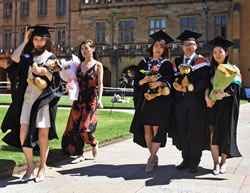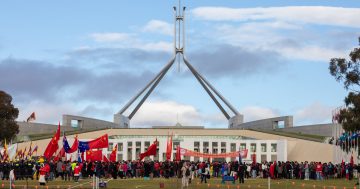Shaun Cameron* says China’s snap decision to ban overseas degrees studied online is a boon for Australian universities, but could there be less obvious reasons for this policy shift?
 The Chinese Government ceased recognising degrees studied online from foreign institutions at the end of January.
The Chinese Government ceased recognising degrees studied online from foreign institutions at the end of January.
This set Chinese students enrolled at universities in Australia scrambling to secure international flights, visas, and accommodation as the first semester of the tertiary year would begin less than a month later.
China’s Ministry of Education provided exemptions for some, but a significant portion of the 50,000 Chinese nationals with student visas for Australia would be required to migrate immediately to continue their studies.
Ostensibly, the ban was adopted to ensure the quality of education experiences for the 700,000 Chinese tertiary students enrolled to study overseas globally.
Some have written that the policy shift was related to Beijing’s move towards a new post-COVID-19 normal.
Others note that this occurred conveniently as a thawing of diplomatic relations with Australia took place.
While Australian universities and tertiary peak bodies have welcomed the move, we also need to consider other motivations for the snap decision by Beijing.
One consideration is the concern that student protesters may be emboldened by domestic disturbances to thrust greater political costs on leaders.
In November 2022, protests erupted across the country against China’s strict zero-COVID policy in what has been described as the biggest expression of public unrest since the 1989 Tiananmen Square pro-democracy movement.
Many of these demonstrations have been led by students on campus, from some 79 universities across 15 Chinese Provinces.
This public airing of grievances was no doubt in response to Beijing’s heavy-handed and growing political control over all facets of daily life, and particularly free speech.
Just as Chinese universities have sent students back to their home Provinces in a bid to disperse the protests, sending them overseas will have the same effect in removing them from the protest environment.
These actions no doubt lowered the risk of demonstrations and/or public embarrassments in the lead-up to Xi Jinping’s selection by the National People’s Congress to a third term as President in March.
Chinese students now forced to rush overseas will also have to contend with a rental crisis, with the national vacancy rate at the lowest point on record.
International students are paying surging rents for fewer housing options, with many being vulnerable to exploitation through fraud and rental scams.
The influx of potentially 40,000 students into the Australian rental market has also resulted in the rise of negative sentiment on social media towards international students in Australian cities.
China Daily has reported on increasing trends of Chinese overseas students returning home upon graduation, with 580,300 of 703,500 (82.48 per cent) registered as returnees in the last publicly released data from 2019.
This represented a rise with 134,800 from 284,000 Chinese students studying overseas in 2010 — an equivalent rate of 47.34 per cent choosing not to return to China.
Reasons for a rise in returnees included optimism about China’s future development, as well as negative experiences overseas such as racism and discrimination.
Also, following then United States President, Donald Trump’s persecution of Chinese-origin researchers, there is a fear of being investigated as spies.
Beijing may be hoping that the experience of entering an Australian housing and cost-of-living crisis may leave a poor impression of the West.
This could diminish the “running philosophy” that has grown popular among young, urban Chinese who wish to leave China for a brighter future elsewhere.
Overseas, they are distanced from China’s youth unemployment levels that hit 19.3 per cent in June 2022, the highest since the data was first made public five years ago..
Beijing’s economy grew by three per cent in 2022, far below its target of 5.5 per cent, and the 2021 rate of 8.1 per cent.
Job prospects are unlikely to improve for Chinese students once they graduate.
Beijing could be hoping that by the time the current cohort of tertiary students do graduate (and presumably wish to return to China) conditions will have improved and domestic satisfaction will increase with potential jobs.
Or perhaps the move could even be a cover to insert a ‘hive of spies’ into Australian society or export influencers to revive the declining system of Confucius Institutes around the globe.
This may be a little too paranoid and cynical, even when referring to a Chinese regime that has weaponised tourism against small Pacific States so they change their diplomatic status with Taiwan.
Despite the surprise decision, Beijing’s policy is a boon for Australian universities and the education export sector.
The public diplomacy effect of so many Chinese students re-entering Australian society, and their freedom from strict COVID-19 controls, will be significant, but perhaps next time Beijing wouldn’t mind leaving a little more warning.
*Shaun Cameron is a postgraduate student in international relations and national security at Curtin University. He works as a Public Servant in Canberra.
This article first appeared on the Australian Institute of International Affairs’ Australian Outlook webpage.











